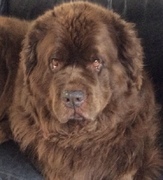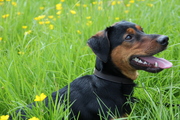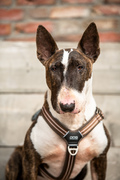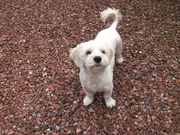Onze informatiepagina's 
Hoi allemaal,
Momenteel bouwen wij aan informatiepagina's voor diereneigenaren op onze website. Nu proberen wij dit zo goed mogelijk te doen. Het is belangrijk dat de teksten goed leesbaar zijn voor "leken" ofwel niet-dierenartsen. Daarnaast zouden wij willen dat de belangrijkste onderwerpen op onze site staan.
Daarom dacht ik dat het misschien leuk is dat jullie meedenken met ons en eventueel onderwerpen aandragen. Misschien missen jullie nog informatie of heb je andere input?
Op onze hondenpagina staat alles over honden.
Ik ben benieuwd wat jullie ervan vinden!
Ischa Swartz
Dierenarts bij Caressa Dierenziekenhuizen
Helaas, dit onderwerp staat op slot.
Dit komt doordat het onderwerp niet meer recent is en in het hondenforum archief terecht ik gekomen.
Als je over "Onze informatiepagina's" wilt praten in het hondenforum dan kun je het beste een nieuw onderwerp aanmaken

Huidproblemen! Omdat DJ hiermee kampt de laatste tijd (het gaat al stukken beter) en omdat ik zoveel meer over huidproblemen lees de laatste tijd, zou dat een heel goed onderwerp kunnen zijn.
Hoi Sophie-Angela
Ga ik (proberen) deze week in de lucht te hijsen!
Bedankt!
Ischa

onderwerp OT ..primaire orthostatische tremor ?
komt voor wereldwijd bij de Molossers, staat nog in de kinderschoenen, maar is al bij vele Molossers geconstateerd, en diagnoses gesteld.

Mooie,duidelijke site!
Bij overige dieren:
misschien nog een vermelding
jaarlijkse vaccinatie bij konijnen.

Specifiek honden, of ook bijvoorbeeld 'overige dieren'? Zo ja:
Konijnen:
- Vaccinatie
- Huidproblemen
- Problemen met de darmen
- Een stuk over voer, waarom welk voer en waarom welk voer niet (gemengd voer zijn volgens mij verschillende meningen over, ik houd het bij enkel biks)
- Waarom het bijvoorbeeld een noodzaak is om konijnen en cavia's etc. bij een soortgenoot te houden
Beste Willemijn,
Jouw aandoening overstijgt een beetje waarvoor de website bedoeld is. Dit wordt te specifiek. Ik heb wel eea nagezocht en zal dat hier (in het engels) neerzetten voor je.
Voor de anderen:
Ik ben druk bezig, keep you posted.
Ischa Swartz
Dierenarts bij Caressa Dierenziekenhuizen
Primary Orthostatic Tremor in Great Danes
J Vet Intern Med 19 :606-609 Jul-Aug'05 Case Report 37 Refs
* Laurent S. Garosi, John H. Rossmeisl, Alexander de Lahunta, G. Diane Shelton, and Graham Lennox
* Davies Veterinary Specialists, Manor Farm Business Park, Higham Gobion, Herts SC5 3HR, UK; e-mail: [email protected]
The 2 Great Danes of this study had a neurologic disorder characterized by difficulty in maintaining orthostatic position due to severe limb tremors that disappeared on walking or sitting, and these tremors correlated with rhythmic electromyographic activity of 13-16 Hz in anti-gravitatory muscles while standing. These clinical and electromyographic features correspond to the orthostatic tremor described in humans. OT was 1st described in 1984 by Heilman in 3 patients presenting with fast leg and trunk tremors on standing, accompanied by unsteadiness that was relieved by walking, sitting, lying, and leaning against a wall or object. OT disappears completely from the limbs if the subject is lifted off the ground. The tremor has a tendency to reappear even in the supine posture if the limb muscles are put into an isometric contraction state, indicating thereby that, even though the tremor occurs on standing, it is essentially orthostasis independent, and the central factor is the contraction of the muscles. There are reports that the tremor makes its appearance in the hands as well, if the subject assumes a crouching posture, with palm and toes touching the floor. Auscultation with the diaphragm of a stethoscope over the limb muscles of human patients with OT shows a repetitive thumping sound, similar to the noise of a distant helicopter, as observed in the dogs of our study. This characteristic sound, like the tremor, is present only on standing and has been reported to be as valuable as an electromyogram in diagnosis. It is not heard when healthy subjects stand and is due to the vibrations set up by the rhythmic and synchronous contractions of muscle motor units in primary OT.
OT differs from other tremors in its clinical and electrophysiologic characteristics. First, tremors can be abolished by simply lifting the standing patient off the ground, as was observed in the 2 dogs of our study, and when walking, tremors disappeared from the nonweight bearing limb during the swing phase of the gait cycle. Secondly, the rapidity of the EMG burst firing rate (13-16 Hz) is far greater than that with other forms of tremor and is considered almost pathognomonic of OT.
The most surprising observation is, however, that many patients have a completely normal interference pattern in a lying position, as was observed in dog 2. In addition to the muscles innervated by the spinal cord, the cranial nerve muscles can be involved, as observed in dog 2, indicating that all motor nuclei have this unique pattern. On the basis of these clinical and electrophysiologic observations, OT is thought to be driven by a unique supraspinal tremor generator, in contrast to other tremors with independent tremor frequencies in different limbs.
The general consensus is that a central oscillator mediates OT without modification by peripheral inputs. Evidence for a supraspinal tremor generator hypothesis was further supported by the finding of Spiegel et al that transcranial magnetic stimulation of one cortical leg area resets OT on both sides. In contrast to parkinsonian tremor and essential tremor, which also are reset by transcranial magnetic stimulation, OT are not reset by peripheral nerve stimuli. Interruption of a cortical projection is likely to account for resetting of OT by magnetic brain stimulation. A subcortical circuit forming a striatothalamocorticostriatal loop is thought to be involved in human OT. In most human patients, the cause of OT is unknown; hence, the term primary orthostatic tremor is used to define this condition. As in most human patients, no metabolic or structural brain disease could be detected in the 2 dogs of our study, despite extensive investigations. OT may be associated in rare circumstances with hydrocephalus, poly-radiculoneuropathy, vascular parkinsonism, or Parkinson disease; however, the pathophysiologic link between orthostatic tremors and these conditions remains uncertain.
Treatments for OT in humans were identified on a purely empirical basis. The medication of choice for OT is clonazepam. Other alternative medications include primidone, phenobarbital, valproic acid, and gabapentin. The mechanism of action of these drugs on OT is poorly understood. Despite being the drug of 1st choice in the control of OT, many patients are unresponsive to clonazepam or are unable to tolerate its adverse effects. Like most benzodiazepines, the short elimination half-life and development of functional tolerance within days to weeks after administration makes clonazepam unsatisfactory for maintenance treatment. Consequently, the 1st choice was to use Phenobarbital in the 2 dogs of this report. Although its mechanism of action is unclear, gabapentin can benefit the human patient with OT even at a low dosage. Unfortunately, the very high cost of this drug for giant breed dogs such as a Great Danes limits its use as a 1st-choice treatment. Despite being structurally related to gamma-aminobutyric acid (GABA), gabapentin does not mimic the pharmacologic properties of GABA, nor does it bind GABA receptors. Studies have shown inhibition of mono-amine release in animals and an increase in serum serotonin concentration in people. How gabapentin affects OT is uncertain, but an effect on the dopaminergic neurons within the basal ganglionic circuitry has been hypothesized.
Identification of an animal model for primary OT may improve the ability to investigate the underlying mechanism, possible genetic abnormalities, and potential therapeutic options of this rare disorder. The female and male dogs of this report still were alive 7 and 22 months, respectively, after diagnosis. Identification of other affected Great Danes and analysis of their pedigree might help us identify a possible genetic link between these dogs.
Hoi Sophie-Angela,
Hier heb ik alvast een hoop zaken uitgewerkt over Huidproblemen en jeuk bij de hond.
Ben benieuwd wat je ervan vindt.
Groetjes,
Ischa Swartz
Dierenarts bij Caressa Dierenziekenhuizen
Hoi Jolanda,
Hier staat de informatie over Giardia bij de hond.
Hopelijk heb je er wat aan. Mochten er nog vragen zijn laat het me dan weten.
Groetjes,
Ischa Swartz
Dierenarts bij Caressa Dierenziekenhuizen

Misschien iets over angst? Of moeten het echt medische dingen zijn?
Anaalklierenproblemen? Of is dat weer een te klein probleempje?

Hier heb ik alvast een hoop zaken uitgewerkt over Huidproblemen en jeuk bij de hond.
Ben benieuwd wat je ervan vindt.
Groetjes,
Ischa Swartz
Dierenarts bij Caressa Dierenziekenhuizen "
Hoi, ik heb het gelezen. Alleen het gaat meer over de ringworm terwijl er uiteraard nog vele andere mijten aanwezig kunnen zijn. Je hebt al vorm van mijt die kan ontstaan door stress. (ooit begrepen)
Ik dacht bij DJ ook aan ringworm, maar dat is het niet. Dus mischien wat uitgebreider nog, indien mogelijk?
(http://www.dierenklinieklemmer.nl/info_honden/huidmijten/index.html voorbeeld)

Cherry eye
Afgescheurde nagel
jeuk
Horner syndroom
Artrose
incontinentie (ook na sterilisatie)
niet ingedaalde teelballen
wisselen van tanden
uitleg eliminatie dieet
kale plekken in de vacht; oorzaken en behandeling
pijnmedicatie (koorts bijv.)
nierproblemen
leverfunctie
diarree en behandeling
alarmsignalen Broodfokhond/fokker herkennen
ik geef het maar mee...
ik zal eens kijken op je site!


Ischa,
Het kan aan mijn pc liggen, maar er loopt een storende rode band door de topictitels bovenaan.
voor de rest; de meeste van m'n titels had je al!
Gebruik van glucosamine?(intraveneus of per os)

Het kan aan mijn pc liggen, maar er loopt een storende rode band door de topictitels bovenaan.
"
Ik denk dat het aan je pc ligt, want hier heb ik nergens last van. Browser is Firefox.
Helaas, dit onderwerp staat op slot.
Dit komt doordat het onderwerp niet meer recent is en in het hondenforum archief terecht ik gekomen.
Als je over "Onze informatiepagina's" wilt praten in het hondenforum dan kun je het beste een nieuw onderwerp aanmaken
Dit topic gaat over het hondenras Great Japanese Dog

- Zoeken op de HondenPage
-
Zoek je iets op de HondenPage ? Vul dan hier jouw zoekwoorden in ?














